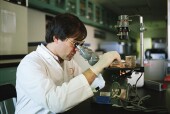
TUESDAY, April 27 (HealthDay News) — A form of the element selenium, which is found in tiny amounts in people’s diets, can help reset a cell’s biological clock after it has been thrown off by cancer-causing chemicals, researchers have found.
The scientists hope this discovery could lead to a way to help the body reboot cells that are disrupted by cancerous agents and potentially stop breast cancer in its tracks.
At issue is the biological clock, or circadian rhythm, which affects how your body works, even down to the cellular level. Studies have already shown that the circadian rhythm can be interrupted through gene manipulation, shift work that involves exposure to light at night and exposure to cancer-causing chemicals.
In the new study, a research team from the Cancer Institute of New Jersey and the Environmental & Occupational Health Sciences Institute (which is jointly administered by UMDNJ-Robert Wood Johnson Medical School and Rutgers, the State University of New Jersey), performed a lab experiment in which they exposed mammary cells to a single dose of a cancer-causing chemical. The biological clock in the cells was disrupted, but was reset and restored after treatment with the form of selenium.
“These findings are significant because they show how disruption of circadian rhythm can increase the risk of mammary cancer and how a simple dietary supplement can reverse this effect, restore rhythm and reduce cancer incidence, at least in experimental models,” Helmut Zarbl, associate director for public health science at the Cancer Institute of New Jersey, said in a news release from the institute.
The researchers have launched a related study to examine how shift work — which resets the body’s biological clock — disrupts how cells operate.
The study is published in the April 27 online edition of the journal Cancer Prevention Research.
More information
The American Cancer Society has more on breast cancer.

